- Home
- Joy Dettman
Thorn on the Rose Page 24
Thorn on the Rose Read online
Page 24
He’d hung one sock, hung it heel and toe, then he turned to give her a geography lesson, and offer his damp hand. ‘Fitzpatrick,’ he said.
Jenny found her own hand amid the bundle of white napkins and took his. ‘I’m Jenny . . . Mrs Hooper,’ she said.
‘The attractive half of the “young couple with child” we were warned about.’
‘I hope he doesn’t disturb you.’
‘We could all use the disturbance,’ he said, and he hung his second sock, heel and toe.
Jenny Hooper. Mrs Jennifer Hooper. It sounded . . . it sounded cleaner than Jenny Morrison, and she felt better for her geography lesson. Number five was on the western side of a house that faced north. Mountains that way, city that way, Woody Creek south-west. Maybe her shoulders relaxed a little. She felt better knowing that she had a ton of dry napkins too, and that tomorrow morning she’d have hot water to wash the next lot.
And she’d have a bath tonight, wash her hair. It would be all right. She’d see Sydney tomorrow and walk across the bridge that gave Sissy blisters as big as pennies; she’d kiss its floorboards. It would be all right.
And tonight she’d sleep with him in a double bed?
She opened the door to number five and dumped the napkins onto that double bed, feeling like Jesus must have felt on the mountain when he was being tempted by the devil. The house was a palace; she’d been offered hot water, a brand-new baby buggy, an extra dozen napkins and a week in Sydney, and all she had to do in exchange was sleep with him.
She folded the napkins and put them in one of the drawers. She hung her few frocks, shook out a dark navy print that Dawn, Maisy’s middle daughter, had bought to wear to her grandmother’s funeral years ago and never worn since. Maisy had given it to Jenny with a pair of slightly worn sandals and a black cardigan she’d knitted for herself, knitted too small. It was a mile too big on Jenny, but warm. The navy print would be too short, but it had a hem she could let down — just like before — just hand-me-downs.
Not that red dress, which looked less respectable when hung beside the navy print. She’d packed the faded lime green, also bought in Melbourne. It wasn’t a bad style but it would forever more raise memories of the night Laurie changed from guardian angel to devil.
‘You’re a beautiful thing,’ he’d said.
That’s all she’d been to him, a pretty toy to play with. She hadn’t known anything back then. Hadn’t been anything. She’d lost herself in Melbourne. She might have been lost up here too but she hadn’t lost herself. And she wasn’t lost, anyway. She could point out the window to Woody Creek.
She glanced at Jim. He was sitting on the floor, Jimmy crawling all over him, crowing at him, probably making too much noise, but happy. It would have been hell if he’d taken a violent dislike to his father.
His father? That’s what he was. It was on his birth certificate. They looked like father and son when they smiled. They had exactly the same chin, the same mouth, exactly the same hands. It was so weird seeing their hands side by side, Jim’s so huge, Jimmy’s so tiny. Weird, too, seeing Jim interacting so naturally with his son. She hadn’t known what to expect, if he’d even touch Jimmy. She’d half expected him to stand back, hands behind his back, looking embarrassed. He wasn’t a bit embarrassed. He was trying to make him say Daddy.
A deep, deep sigh arose from the soles of her shoes. It would be all right. She’d worked out a way of sleeping with Sissy, between the top sheet and blanket. It had been prickly with a woollen blanket against her skin but less prickly than Sissy. That’s what she’d do. She was in Sydney and it would be all right.
There was a hum of noise through the house now; the ongoing hum of a wireless, the movement of other lodgers in the passage.
‘I’ll give him a bath,’ she said. ‘He’s usually asleep before seven.’
‘I thought we’d eat somewhere.’
‘You go if you like.’
The bathroom was vacant, and like everything else in this place it was clean. She put the plug in, set hot and cold water running, said another prayer to the gods of hot water, then went back to the room to get Jimmy and a towel, soap, clean clothing for him and for herself.
Jim didn’t go out to eat. He followed them to the bathroom and stood watching Jimmy’s perfect little body stripped, watching him bathed, his hair lathered white, rinsed clean and made sweet again. She dressed him in his nightshirt and handed him to Jim.
‘Give him a banana,’ she said. ‘I’m going to use his bathwater.’ She locked the door and turned on the hot water tap to fill the bath higher.
Hot water is restorative. Being clean after days of being dirty is euphoric. Jenny sat in that bath until she heard knocking, heard the door tested. There were two bathrooms, one upstairs, one down, but for how many people?
She’d had her hair cut short for the trip. She dried it with a towel then dressed in the navy print, shorter than most of her frocks, but long enough — and was pleased to be wearing it when she got back to number five where she found a chunky little army bloke and a dark-headed woman sitting on the double bed. Jim introduced them as Nobby and his wife, Rosemary. Rosemary had Jimmy on her lap.
He crowed for Jenny and she swung him into her arms, kissed him for preferring her, then sat on the bed with their visitors, who had been given a downstairs room at the rear of the house, with twin beds they’d moved together, Rosemary said. She’d travelled up from a place near Albury, half as far as Jenny.
They pooled their resources, their sliced ham, bread, bananas, Jenny’s coffee essence and condensed milk — once Jimmy was down for the night, and he hadn’t gone down easily, or silently. It was almost eight when she joined the trio around one of the kitchen tables.
‘I’m dying to have a baby,’ Rosemary said. ‘We decided when we got married that we wouldn’t have one until after the war.’
And how did she plan to manage that with their twin beds moved together?
Paddy, Artie and Bull were out at Bondi with Paddy’s aunty, Nobby said. Paddy’s girl was coming in tomorrow. They were still hoping to get a room somewhere.
Easy conversation, Nobby’s arm slung possessively along the back of Rosemary’s chair, her eyes rarely leaving him. Jim and Jenny sat apart, the table’s corner between them, her eyes evading his, Jim’s eyes trying hard to look elsewhere but too often failing.
Then Nobby and Rosemary said their goodnights, Jenny and Jim were alone and the conversation dried up.
‘If I’d known we’d have a kitchen, I would have brought eggs. Jimmy loves eggs,’ she said.
‘They would have made a nice mess of your case if they’d broken.’
‘I suppose you can buy them up here.’
He stood, ready to go back to the room. She didn’t want to go back to a dark room.
‘Jimmy might have woken up,’ he said.
‘He won’t move until daylight, and we’ll hear him if he does.’
She found a dishcloth, wiped the table, wiped the sink, read the sign about how to get her hands on the iron, read the instructions on how to light the gas oven while Jim leaned against the doorframe, waiting for her to be done with her cleaning.
‘I came up here so you could see Jimmy — so he could see you.’
‘And to marry me,’ he said.
She turned her back, found a broom behind the door and swept the floor, found a dustpan — and realised she was doing an Amber, maybe understood something of her mother’s cleaning mania. It was a response to being trapped in a situation she couldn’t handle — trapped with no way out.
But she wasn’t Amber. And she had a return ticket. And she was stronger than Amber because Granny said she was. She put the broom back where she’d found it, put the dustpan back with crumbs still in it, and led the way upstairs.
They couldn’t turn the light on and disturb Jimmy, so they left the door wide open. The passage light lit the room. Jim sat on the bed. Jenny sat on the dressing table.
An elderly woman with a
frizzy perm peered in. ‘Good evening,’ she said.
‘Good evening,’ they chorused.
‘I’m Mrs Collins from next door.’
‘Jenny and Jim,’ Jim said.
The woman went back next door, and Jim closed their door.
It was pitch dark then, shades of the cellar. He kept his distance, but he was braver in the dark.
‘In a way I’m glad I didn’t know you were having Jimmy. Having me probably killed my mother.’
‘I wouldn’t doubt it,’ she said.
‘You said you were in hospital. Did they have to operate on you?’
‘They dragged him out with forceps, if you must know. Now change the subject.’
‘I’d make sure it didn’t happen again, Jen.’
‘Don’t worry. It won’t.’
Silence then. Footsteps in the passage, music from below, water sluicing through pipes.
‘They issued us with . . . there’s places down here where a lot of the single blokes will be going.’
‘You’re single. Go.’
‘I’m not going anywhere. I’m just letting you know I’ve got . . . protection.’
‘I’ve already let you know that you won’t need protection.’
‘Righto,’ he said.
A longer silence, but unlike the cellar, not a true silence. Jimmy breathing, Jim’s shoe scuffing the floor, someone rattling pots beneath them.
‘They don’t want everyone turning up at the boats with a disease . . .’
‘I’m not dumb, Jim! Will you shut up about it?’
‘I know you’re not dumb. You’re beautiful, and I love you, and every nerve in my body is aching to hold you.’
‘I didn’t come up here for that.’
‘I know that, too. All I’m saying is that if the rubbers stop diseases getting in then they stop . . . anything getting out.’
‘Jesus! What’s happened to you?’
‘You did,’ he said.
‘I bet you didn’t talk to Sissy about protection and blokes catching diseases.’
‘I did more listening than talking.’
Someone walked by. The door opposite opened, closed. Jenny slid from the dressing table and went to the window, struggling to open it. He opened it and stood beside her, head and shoulders out. There was barely room for two to stand. Arms brushed.
Why could standing near him make her feel so breakable? She wasn’t breakable. Granny said so. Granny said she had the resilience of Indian rubber; knock her down and she’d spring back up. Balloons were made of rubber. The air eventually seeped out through invisible holes. Standing so close to him was letting her air out.
Then his arm was around her, just resting lightly at her waist.
‘I told you it’s not happening, Jim —’
‘You told me you loved me since you were four years old, too.’
‘You were going away!’
‘I’m going away again. Just let me hold you.’
She stood unmoving and never wanted to move again. And there had to be something wrong with her; she wanted him to do more than just hold her. She was tired, falling down tired, and all she could think about was whether he would kiss her. And then he did, and she stood there like a bird, head out of its nest, mouth open, begging to be fed, her entire aching body sighing out with the peace of being fed what her body needed to survive.
There was no harm in kissing, half in, half out of that window, but he drew her in and she stood crushed against him, feeling the ache of her seeping into the ache of him and feeling both of those aching souls wanting so much more than kissing. Like that second night in the cellar when she’d sworn there’d be no second night, like every time they’d driven out to the farm, day or night.
She either loved him or there was something unnatural about her. She had babies at the drop of a hat and knew it. It couldn’t happen again. She’d promised Granny it wouldn’t happen again — and she wanted it to happen, wanted his hands all over her. Loved him, his mouth, his china cup teeth. She wished there was an injection she could have that would immunise her forever against having babies. Wondered how Rosemary could say with such certainty that she wasn’t having a baby until after the war. Didn’t want to pull away. Had to.
‘It’s not happening. If Jimmy hadn’t come early, they would have had to slice me open to get him out. I’m never, not ever, having another one.’
‘I’ll use two rubbers.’
Back in his arms again and that bed behind her. She knew about the rubber sheaths a man could use. Granny had told her everything when she’d learnt Jimmy was on the way. She’d told her about times of the month, about things a woman could use to protect herself.
‘If you’re determined to give your body to every man who looks at you twice, then you’d be well advised to protect yourself,’ she’d said.
Angry Granny, angry again when Maisy told her that Norman had booked the return ticket, angry at Maisy and Norman.
‘You come home to me pregnant again, my girl, and I wash my hands of you. And that’s a promise.’ Granny always kept her promises.
This time Jenny got away from him, got out the door, down the passage and downstairs to the lodgers’ sitting room, where an old dame who could have been Lorna Hooper’s shrunken maiden aunt sat sorting papers beside a wireless.
‘Good evening,’ Jenny said, and the dame raised a finger. She was listening to the nine o’clock news.
‘Giving the Japanese their due, their advance across the Owen Stanley Range was a remarkable feat, carried out against geography and some of the toughest fighting troops in the world. The chief Allied problem is to combat the Japanese jungle tactics. Port Moresby is the key to defence of our . . .”
Jim came to sit beside her on a two-seater couch; she never learned why Port Moresby was the key to defence. She heard the announcer say that Sydney could expect a fine day tomorrow, then the news ended and the old dame started questioning Jim.
He’d seen what the Japs had done to Darwin. He knew how many had died there. The dame spoke of the government’s censoring of news, the sterilisation of it before it was presented to those at home.
They sat until the wireless told them it was ten o’clock, until the dame took up her papers, gestured towards a sign over the wireless. In respect to other residents, radio will be turned off at ten thirty. ‘Robertson,’ she said, and she left.
Vera Lynn was singing ‘We’ll Meet Again’ and Jenny loved it. She moved to the dame’s vacated chair and not a word was spoken until the song ended.
‘Go to bed, Jim,’ she said.
‘Righto,’ he said, but made no move to go. Not until the wireless told them it was ten thirty, not until Jenny turned it off, did he rise to go. She stayed where she was.
‘You can’t stay down here all night.’
‘There are no signs telling me I can’t,’ she said.
‘I won’t touch you.’
‘You won’t get a chance.’
He left and she moved back to the couch, convinced for a time that she could sleep on it, until every light other than the sitting room light went out, until the house stilled and the chill started creeping into her bones.
She felt her way back to the stairs, felt her way up, past the permed-hair lady’s door, feeling for the doorknob of number five.
He didn’t move, didn’t speak when she entered the room on tiptoe. She thought he was sleeping. She took off her shoes and frock, and that was all she took off, she felt her way to the bed and slid in between the top sheet and the blanket.
He wasn’t asleep. ‘You’re not in properly,’ he said.
‘It’s properly enough for me.’
‘Get under the sheet. It’s like I’m in a straitjacket.’
‘That’s where I want you,’ she said.
‘I won’t touch you. I promise. We’ll get married tomorrow.’
‘That won’t make any difference.’
‘It will to Pops.’
‘I can’t get
married. I’m eighteen,’ she said, but she slid between the sheets, crisp sheets, crisp soft pillow, no gravitational pull towards the centre of the mattress.
‘Put your age up.’
‘It wouldn’t be legal.’
She turned to face the door, he turned towards the window, and back to back they faced their first night in Sydney.
JEN AND JIM, 1942
Jim told her over breakfast that the married chaps in his unit had the paymaster send money home to their wives. Jenny asked him if he was trying to buy Jimmy like his father had tried to buy him.
‘I don’t need to buy him. Anyone can see he’s mine.’
‘Then why can’t you be content with that?’
‘I want both of you.’
They left the boarding house with the workers and by nine were in the centre of the city, Jim in quest of a jeweller who would resize the wedding ring that refused to stay on Jenny’s finger. Near ten, a little man in a side street said he could have it done by four. Jim left it with him. And how they were going to fill the next six hours, Jenny didn’t know. She was barely speaking to him.
Eating filled time. They ate a second breakfast at a café. He ordered a glass of milk for Jimmy, who had never drunk anything other than goat’s and condensed milk, but he seemed to like it well enough. They looked in shop windows, licked ice-cream in a park while Jimmy plastered his face with ice-cream. They ate lunch too early, and poured a glass of milk into Jimmy’s bottle, hoping he’d settle down for a nap in his stroller. He’d had enough of Sydney and the crowds. He emptied the bottle but didn’t nap.
They were walking the streets with three hours still to kill when Jimmy let fly with the contents of his bottle, and probably his ice-cream, and when Jenny attempted to lift him from the mess he aimed his breakfast at her. She caught the lot, all over her one respectable dress.
A passer-by pointed them in the direction of public toilets. Jenny had bought a sweater for Jimmy and half a dozen napkins. Jim took one napkin and the stroller into the gents’ lavatory while Jenny took Jimmy into the ladies’ and gave him a bath in a hand basin. No soap, cold water, but she got him clean enough, dry enough, clad him in sweater and napkin then washed what she could from her frock.

 The Hope Flower
The Hope Flower Trails in the Dust
Trails in the Dust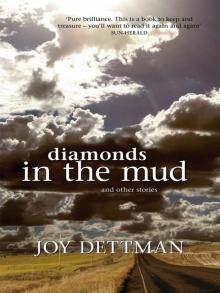 Diamonds in the Mud and Other Stories
Diamonds in the Mud and Other Stories Moth to the Flame
Moth to the Flame The Tying of Threads
The Tying of Threads Wind in the Wires
Wind in the Wires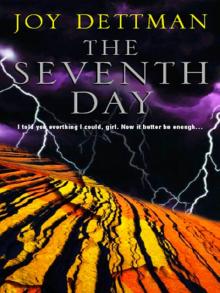 The Seventh Day
The Seventh Day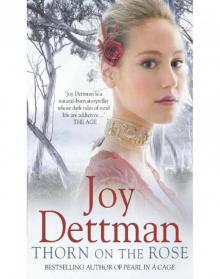 Thorn on the Rose
Thorn on the Rose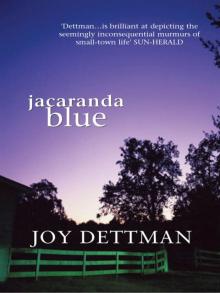 Jacaranda Blue
Jacaranda Blue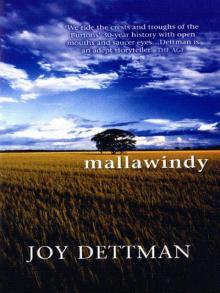 Mallawindy
Mallawindy Ripples on a Pond
Ripples on a Pond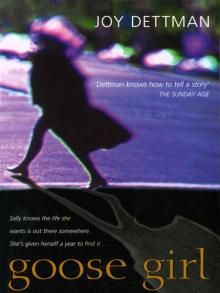 Goose Girl
Goose Girl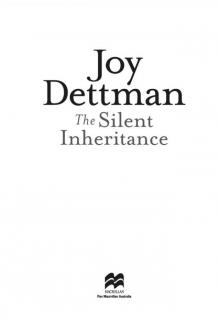 The Silent Inheritance
The Silent Inheritance Henry’s Daughter
Henry’s Daughter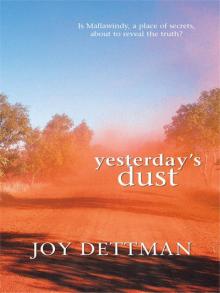 Yesterday's Dust
Yesterday's Dust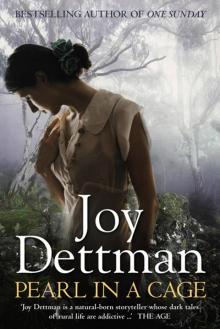 Pearl in a Cage
Pearl in a Cage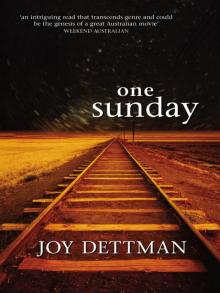 One Sunday
One Sunday